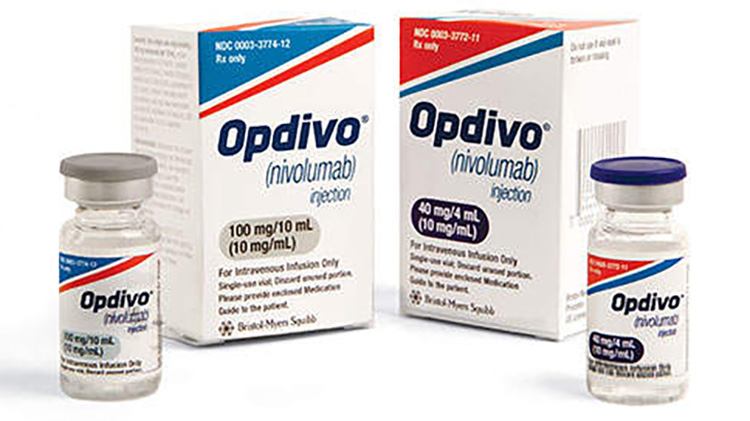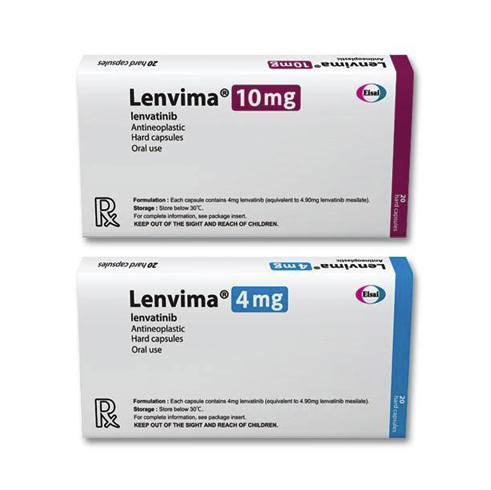Opdivo (Nivolumab) vs Lenvima (lenvatinib)
Opdivo (Nivolumab) vs Lenvima (lenvatinib)
Opdivo (nivolumab) is an immune checkpoint inhibitor that works by enhancing the body's immune response against cancer cells, and is commonly used in various types of cancers, including melanoma, lung, and kidney cancers. Lenvima (lenvatinib) is a tyrosine kinase inhibitor that targets specific enzymes involved in the growth and spread of cancer cells, and is often used for treating thyroid cancer and in combination with other drugs for kidney and endometrial cancers. The choice between Opdivo and Lenvima would depend on the specific type of cancer, its stage, the patient's overall health, and the treatment goals, as these medications have different mechanisms of action and side effect profiles.
Difference between Opdivo and Lenvima
| Metric | Opdivo (Nivolumab) | Lenvima (lenvatinib) |
|---|---|---|
| Generic name | Nivolumab | Lenvatinib |
| Indications | Various types of cancer including melanoma, lung cancer, renal cell carcinoma, Hodgkin lymphoma, head and neck cancer, urothelial carcinoma, and colorectal cancer | Thyroid cancer, renal cell carcinoma, hepatocellular carcinoma, and in combination with other drugs for endometrial carcinoma |
| Mechanism of action | PD-1 immune checkpoint inhibitor that blocks the interaction between PD-1 and its ligands, PD-L1 and PD-L2 | Multikinase inhibitor that targets vascular endothelial growth factor (VEGF) receptors, fibroblast growth factor (FGF) receptors, platelet-derived growth factor (PDGF) receptor alpha, RET, and KIT |
| Brand names | Opdivo | Lenvima |
| Administrative route | Intravenous infusion | Oral |
| Side effects | Fatigue, rash, musculoskeletal pain, pruritus, diarrhea, nausea, and others | Hypertension, fatigue, diarrhea, decreased appetite, weight loss, and others |
| Contraindications | Known hypersensitivity to nivolumab or any of its excipients | Known hypersensitivity to lenvatinib or any of its excipients |
| Drug class | Immune checkpoint inhibitor | Tyrosine kinase inhibitor |
| Manufacturer | Bristol-Myers Squibb | Eisai Co., Ltd. |
Efficacy
Overview of Opdivo (Nivolumab) and Lenvima (Lenvatinib) in Liver Cancer
Opdivo (nivolumab) and Lenvima (lenvatinib) are two medications that have shown efficacy in the treatment of liver cancer, specifically hepatocellular carcinoma (HCC), which is the most common type of liver cancer. Opdivo is an immune checkpoint inhibitor that works by blocking the PD-1 pathway, which cancer cells often exploit to evade the immune system. Lenvima, on the other hand, is a multikinase inhibitor that targets the vascular endothelial growth factor (VEGF) receptors, among other kinases, and is involved in angiogenesis, the process by which tumors develop their own blood supply.
Efficacy of Lenvima (Lenvatinib) as a First-Line Treatment
Lenvima has been approved as a first-line treatment for unresectable hepatocellular carcinoma. In a pivotal phase 3 clinical trial known as the REFLECT study, lenvatinib demonstrated non-inferiority to the standard-of-care sorafenib in terms of overall survival. Additionally, lenvatinib showed statistically significant improvements in progression-free survival (PFS) and a higher objective response rate (ORR) compared to sorafenib, suggesting that lenvatinib may offer some benefits over the existing first-line treatment for HCC.
Efficacy of Opdivo (Nivolumab) as a Second-Line Treatment
Opdivo has been evaluated as a second-line treatment for patients with hepatocellular carcinoma who have previously been treated with sorafenib. The CheckMate 040 trial, a phase 1/2 study, indicated that nivolumab had a manageable safety profile and provided durable responses in a subset of patients with advanced HCC. The overall response rate and the duration of response observed in the trial supported the potential of nivolumab as a treatment option for HCC after prior sorafenib therapy.
Combination Therapy in Advanced HCC
More recently, the combination of Opdivo and Lenvima has been explored as a treatment for advanced HCC. The CheckMate 459 study, a phase 3 trial, investigated the combination of nivolumab plus lenvatinib versus sorafenib. While the study did not meet its primary endpoint of improving overall survival compared to sorafenib, the combination therapy did show an improvement in progression-free survival and objective response rate. These findings suggest that the combination of nivolumab and lenvatinib may offer a potential therapeutic strategy for patients with advanced HCC, although further research is needed to fully understand the benefits and optimal use of this combination.
Regulatory Agency Approvals
Opdivo
-
European Medical Agency (EMA), European Union

-
Food and Drug Administration (FDA), USA

-
Health Canada

-
Pharmaceuticals and Medical Devices Agency (PMDA), Japan

-
Therapeutic Goods Administration (TGA), Australia

-
Medsafe (NZ)

Lenvima
-
European Medical Agency (EMA), European Union

-
Food and Drug Administration (FDA), USA

-
Health Canada

-
Pharmaceuticals and Medical Devices Agency (PMDA), Japan

-
Therapeutic Goods Administration (TGA), Australia

Access Opdivo or Lenvima today
If Opdivo or Lenvima are not approved or available in your country (e.g. due to supply issues), you can access them via Everyone.org.
How it works

Make an enquiry
Choose the medicine you want to buy, answer a couple of questions, and upload your prescription to speed things up. We’ll get back to you within 24 hours.


Make an enquiry
Choose the medicine you want to buy, answer a couple of questions, and upload your prescription to speed things up. We’ll get back to you within 24 hours.


Breeze through the paperwork
We'll guide you through the required documents for importing unapproved medicine, ensuring you have all the necessary information.


Get a personalized quote
We’ll prepare a quote for you, including medicine costs and any shipping, administrative, or import fees that may apply.


Receive your medicine
Accept the quote and we’ll handle the rest - sourcing and safely delivering your medicine.

Some text on this page has been automatically generated. Speak to your physician before you start a new treatment or medication.
Let's talk
If you have any questions, call us or send us a message through WhatsApp or email:
Contact us




